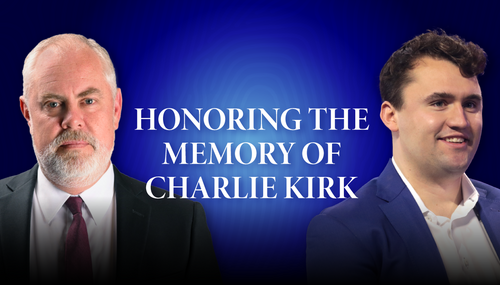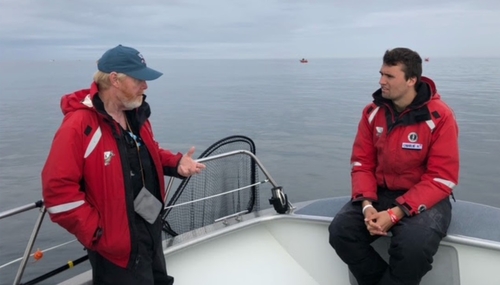Restricting abortion is like subjugating women to slavery, according to one abortionist. In other words, women’s “freedom” relies on the ability to destroy others’ freedom – the lives of the unborn.
How demeaning.
 On Monday, Daily Show Host Trevor Noah interviewed Willie J. Parker, a Mississippi abortionist and former Planned Parenthood medical director, on his Life’s Work memoir released April 4. During the interview, Parker called himself “pro-life” and compared his position to Abraham Lincoln’s fight against slavery. He also saw himself as fulfilling the legacy of Dr. Martin Luther King, Jr.
On Monday, Daily Show Host Trevor Noah interviewed Willie J. Parker, a Mississippi abortionist and former Planned Parenthood medical director, on his Life’s Work memoir released April 4. During the interview, Parker called himself “pro-life” and compared his position to Abraham Lincoln’s fight against slavery. He also saw himself as fulfilling the legacy of Dr. Martin Luther King, Jr.
Instead of describing him as an abortionist, Noah introduced Parker as a “doctor, reproductive justice activist and author.” For his first question, Noah asked “what is it like” for a woman to get an abortion in the Deep South.
Besides “waiting periods” and “financial barriers,” Parker complained about the “stigma and the shame” surrounding abortion there. Women, he said, “are made to feel that they are doing something immoral by choosing their lives over the ambitions that other people have for them.”
Except for that abortion isn’t about women “choosing their lives” over others’ “ambitions.” It’s about destroying the ambitions of another person: the unborn baby.
While Parker admitted that a waiting period for women considering abortion “sounds good,” he urged that it didn’t fit with “reality.” Women “being forced to wait to indulge somebody else’s sensitivities,” he said, means “we don't trust women with their important decisions.”
When Noah brought up Parker’s “religious background” as a Christian, Parker argued that he had “always been pro-life.”
“[B]ut what I mean by pro-life, pro-life of the woman,” he argued. According to Parker, he was pro-life and those who advocate for the lives of the unborn weren’t.
“I think ‘pro-life’ is a misnomer for people who are against abortion,” he bashed, and “people who are opposed to abortion are ‘pro-fetus’ … you can't have more than interest in a pregnancy than a woman's care.”
But abortion does pose danger to women – even if the media refuse to report it. Never mind that one life is always lost in abortion.
Pointing to the memoir, Noah asked about Parker’s comparison of the “control of a [sic] women's bodies” to slavery. “Why would you say that?” he asked.
“[I]f you've never lived with your back to the wall,” Parker began, “it would be really hard for you to understand what it's like to have the most essential aspect of your being, the ability to make decisions about your lives – your life, to have hopes and aspirations and dreams and to have that controlled by someone else.”
Ironically, Parker could have said the exact thing to describe how an unborn baby facing abortion is “controlled by someone else.”
Parker went on to compare himself to former President Abraham Lincoln.
“I feel like I'm in the same position that Abraham Lincoln was when someone asked him, ‘Why did you free the slaves?’” he said. “There are many reasons the Civil War was fought, but I like it when he said that, ‘As I would not be a slave, so I will not be a master.’”
“As a man,” he added, “I refuse to participate in a system that would deny women the same agency and the same right to make decisions about their lives that I have as a man.” But he would participate in a system that denies unborn men and women the rights of born men and women.
Parker also tied abortion to the constitution while discussing why women shouldn’t have to travel to another state to get an abortion.
Under the constitution, he argued, “everyone should have equal access and equal protection under the law,” or, in other words, “one state is not free to impose its responsibility to ensure the health of its citizens to another state.” “Citizens” not including the unborn, that is.
“So I think it's a very callous statement to say” women can travel to another state like the president did, he protested. “[I]t’s almost like Marie Antoinette, ‘Just let them eat cake.’”
Noah echoed him: “It’s callous and it doesn't take into account the realities of the situation that many women are in.”
Besides Lincoln, Parker also saw in himself the influence of Dr. Martin Luther King, Jr. The date of his book’s release, he added, boasted the same date as Dr. King’s assassination.
“For me, what that means is that, I like to imagine that I was the little kid living in Alabama who he had hopes and aspirations for, that my dreams wouldn't be determined by the color of my skin,” he said. And so this book, my career, is really a recognition of the vitality of the movement that he gave his life for.”
Dr. King’s niece, Dr. Alveda King, would disagree.
Trevor concluded by congratulating Parker on his “amazing story” and “beautiful book.”
Parker has long fascinated the liberal media. Earlier this year, a New York Times Magazine columnist wrote on the “cool” abortionist who called an unborn baby a “human entity,” instead of a “person.” In 2015, The Times published his piece, “Why I Provide Abortions,” where he insisted that abortion “respond[s] to our patients’ needs” and therefore expresses “the deepest level of love that you can have for another person.” He has also appeared in Cosmopolitan, where he compared a Planned Parenthood executive to “Jesus before crucifixion.”





